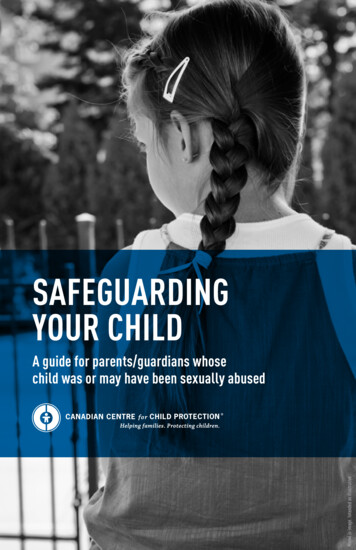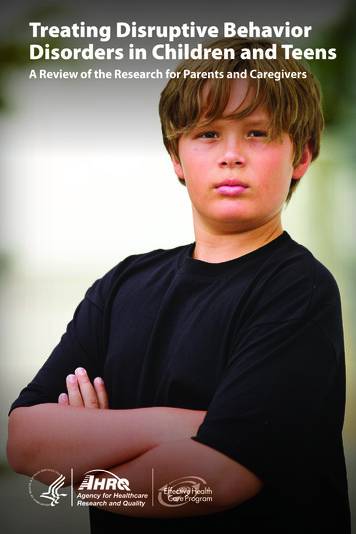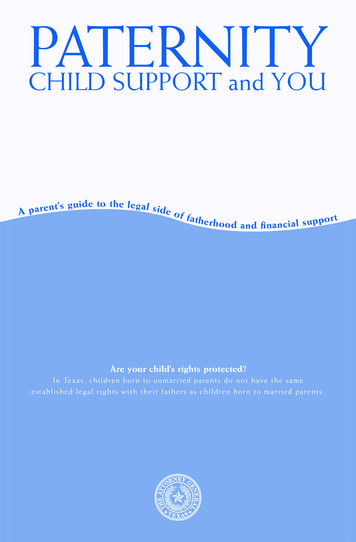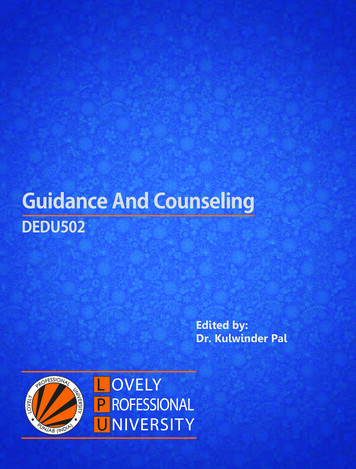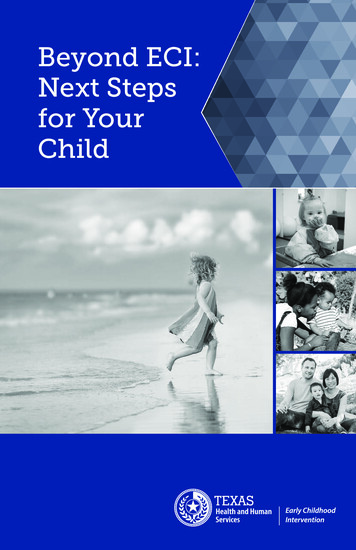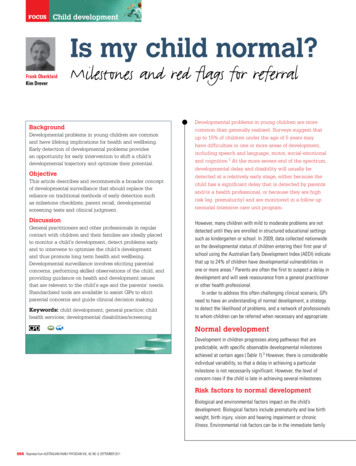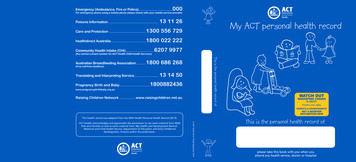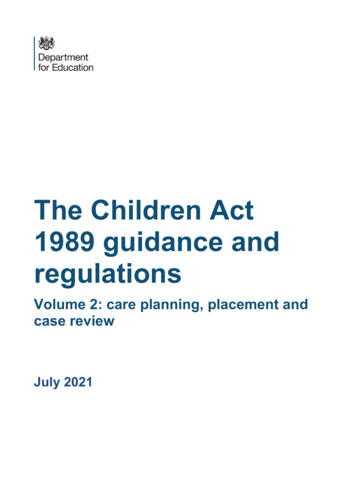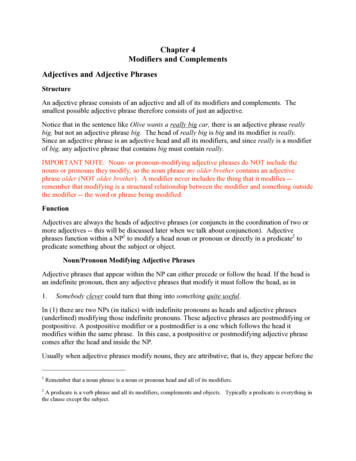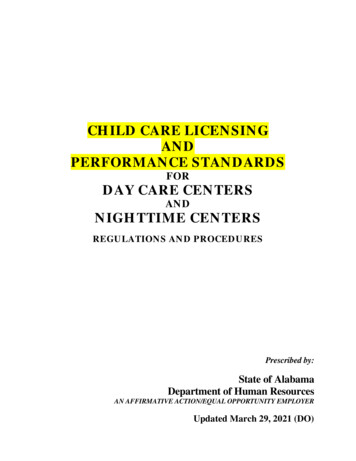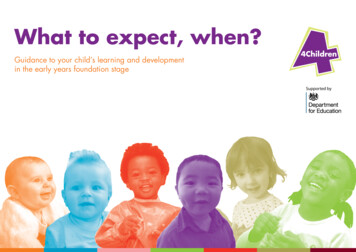
Transcription
What to expect, when?Guidance to your child’s learning and developmentin the early years foundation stageSupported by1 What to expect, when? - Guidance to your child’s learning and development in the early years foundation stagewww.4Children.org.uk 4Children 2015
How to use this guideThe Early Years Foundation Stage Framework (EYFS) sets out the learning and development stages for children as they grow frombirth to five years. For those working in the early years - whether in a nursery, pre-school, a childminder or in a reception class inschool - the EYFS outlines what they need to do to support your child.The purpose of this booklet is to help you as a parent/carer* find out more about how your child is learning and developingduring their first five years, in relation to the EYFS. Children develop more rapidly during the first five years of their lives than atany other time. This booklet has been written to help you as a parent know what to expect during these vitally important yearsby focusing on the seven areas of learning and development which are covered in the EYFS.In this guide, your child’s first five years have been divided up into six age bands which overlap. This is because every childis different and children do not grow and develop at the same rate. It highlights what you might notice your childdoing at these points.Children learn and develop through playing, exploring, being active, creative and being asked questions to help their thinking.After each age band we give you an example of some ideas and tips as to how you can help your child’s learning anddevelopment. Page 34 details where you can find out more.As you know, being a parent is very special and amazing as you watch your child grow up. It can also have challenges. Wehope this booklet will help you to know how your child is developing by highlighting what to expect, remembering that allchildren are different.One way of using this booklet could be to use it as a reference - see what you notice your child can do. Use it as a prompt toexplore and try new things together.In using this booklet, if you feel unsure about your child’s learning and development you might want to speak to someone fromyour local children’s centre, your child’s key person, a childminder or a health professional.To find out more about the EYFS, please visit www.foundationyears.org.uk/parents. For information about free early educationand entitlement for 2, 3 and 4 year olds visit www.gov.uk/free-early-educationThe 7 areas of learning are:Prime areas of learning particularlyimportant in the first 3 yearsPersonal, Social andEmotional DevelopmentPhysical DevelopmentCommunication andLanguageSpecific areas of learningLiteracyMathematicsWe thank the parents* who contributed to writing this booklet.“This booklet is fantastic and will really help me knowhow well my child is developing and learning.”“I have spent ages on Google trying to find out ifKatie is where she should be – this is great!”Understanding the WorldExpressive Arts and Design*At all points in this booklet when we refer to parents we include carers, family members and partners, of any gender.2 What to expect, when? - Guidance to your child’s learning and development in the early years foundation stagewww.4Children.org.uk 4Children 2015
What to expect, when?Guidance to your child’s learning and development in theearly years foundation stageBirth - 11 months22 - 36 monthsPage 4 - 5What do you notice in your baby’s early growing?Focus more on the prime areas of learning.Page 16 - 17What do you notice about your child as they start becomingmore self confident and aware, and managing their feelingsand behaviour?Focus on the prime areas of learning and give more attentionto the specific areas.8 - 20 months30 - 50 monthsPage 8 - 9What do you notice as your baby starts rolling, touchingthings and playing with toys?Focus more on the prime areas of learning.Page 20 - 23What do you notice about your child as they grow inconfidence?Focus on the prime and specific areas of learning.16 - 26 months40 - 60 monthsPage 12 - 13Your child might be going to a nursery or childminder. Discusswhat you are noticing with them.Focus more on the prime areas of learning.Page 26 - 31In this age band we list early learning goals which are theexpectation for where children may have reached at the endof reception year at school.Focus on the prime and specific areas of learning.In this booklet your child’s first five years are divided up into the six age bandsabove to highlight what you might notice your child doing at these points.Please remember: every child is different! Children do not grow and develop atthe same rate.After each age band we give you some ideas and tips as to how you can helpyour child’s learning and development. Page 34 details where you can find outmore.3 What to expect, when? - Guidance to your child’s learning and development in the early years foundation stagewww.4Children.org.uk 4Children 2015
Birth -11 months: You might notice that.Personal, Social and Emotional DevelopmentPhysical DevelopmentCommunication and LanguageMaking relationshipsMoving and handlingListening and attention I like to be with other babies and grown ups. I look at facesand move my arms and legs to show that I like to be with them. I move my head or body when I hear noises and see thingsor people. I move my head or body to find sounds that I know when Ihear them. I look at faces and can copy movements you make with yourface, like sticking out my tongue, opening and closing mymouth or making my eyes bigger. I can hold my head up. I listen to different sounds grown ups make with their voicesand can move my arms, legs or body or make noises whenI hear them. I can show you that I like you talking to me by moving my armsand legs, making my eyes bigger and opening and closing mymouth. I can roll over from my back on to my tummy and from mytummy on to my back. I can show you that I am interested in what you are doing bylooking at and watching you. I can show that I like you to hold me or cuddle me by snugglingup to you, smiling, looking at your face or stroking you.Self confidence and self awareness I laugh and gurgle to tell you that I like being tickled or liftedup. I can use my voice or look at you to get your attention and tellyou that I want you to be with me.Managing feelings and behaviour I like to see grown ups’ faces and hear their voices when I amfeeling upset, worried, tired or hungry. I snuggle into grown ups that I know when I am feeling upset,worried or tired. I can move my arms and legs in different ways such aswaving and kicking. When I am lying on my tummy I can use my arms to helpme lift my head and then my chest. I like to look at and play with my hands and feet. I can reach out and touch things that are near to me. I can hold things in my hand that are near to me. I like to explore things by putting them in my mouth.Health and self care I like it when you cuddle me, stroke my cheeks or pat myback. I will show you that I am upset, tired or hungry by makingnoises such as crying or by moving my arms, legs or body. I will show you that I know when it is meal time by lookingat you, my food or drink or by making noises or moving myarms and legs to tell you that I am excited or ready. When I am feeling upset, I like you to hold me, rock me, speakto me or sing to me quietly and calmly. I can show you that I am happy, worried or excited by thenoises that I make, by opening and closing my eyes or the wayI move my arms and legs. I can show you that I know how other people are feelingby smiling back at a grown up when they smile at me andbecoming upset when I hear another child crying. I will show you that I like you talking to me by smiling atyou, looking at you or moving my arms, legs or body. Sometimes when you talk to me I will become quieter ormake noises and move my arms, legs or body. When you talk to me, I look at you, but I will turn my heador body when you stop. I like listening to sounds that things I know and grown upsmake. I listen when you sing songs and rhymes as you tickle mytummy or play with my fingers and toes. I stop what I am doing and listen to a new voice or soundwhen I hear it.Understanding When you say my name I stop what I am doing and lookat you. I understand what you mean when you use words andactions together. For example, as you wave and say “byebye” or use actions as you sing rhymes like “Wind thebobbin up”.Speaking I can let you know what I want or how I am feeling bymaking different noises such as crying, gurgling, babblingand squealing. When a grown up that I know talks to me I make soundsand noises that are special to me. I can lift up my arms when I think you are going to pick meup. I like to make different sounds and noises, such as “baba”,“nono” and “gogo” when a grown up talks to me.4 What to expect, when? - Guidance to your child’s learning and development in the early years foundation stagewww.4Children.org.uk 4Children 2015
LiteracyMathematicsUnderstanding the WorldExpressive Arts and DesignReadingNumbersPeople and communities I like you to sing songs and rhymes andread stories to me. I notice when there is one thing or whenthere are lots of things (up to 3 things) in abowl or basket. Babies need to develop relationships withgrown ups.Exploring and using media andmaterialsShape, space and measure I move my eyes and then my head when Iwant to look at things.Writing Babies need to hear words and learn to usethese. Babies need to explore what happenswhen they use their hands and feet. Babies need to play with things and find outwhat they can do with their hands, feet andbody.The world I like to look around where I am for thingsthat I would like to play with. I smile at things that I like to play with. I like to kick or shake things that make anoise, like a mobile or rattle, over and overagain.Technology Babies need to explore lots of differentthings to find out what they can do withthem.Being imaginative Babies need to play with lots of differentthings to find out what they can do withthem. Babies need to develop relationships withgrown ups. Babies need to hear words and learn touse them. Babies need to explore lots of different thingsto find out what they can do with them.Notes5 What to expect, when? - Guidance to your child’s learning and development in the early years foundation stagewww.4Children.org.uk 4Children 2015
Birth - 11 months: How can you help me with my learning?Communication and LanguageListening and attention Play “peek a boo” games with me. Use your hands ora scarf to hide your face. Sing a song or rhyme as you rock or hug me.UnderstandingPersonal, Social and EmotionalDevelopmentMaking relationships Let me copy the movements you make with yourface, like when you open and close your mouthor open and shut your eyes. Tell me what you’re doing as you’re changing mynappy or getting me dressed.Speaking Have a chat with me by copying my sounds andbabbling.Self confidence and self awareness Give me one of my favourite toys, the packetof wipes or a clean nappy to hold when you’rechanging me.Manage my feelings and behaviour Tickle my feet Let me see you face and hear your voice when Iam grumpy tired or hungry.Physical DevelopmentMoving and handling Put me on my tummy or back, on a softmat or blanket, and let me kick my legs. Cover my legs with a crinkly blanket orpiece of light, soft material so I can kickit off Put my favourite toys by me so that I canreach out and touch it or try to hold it.Health and self care Stroke my cheeks or pat my back as youtalk to me.6 What to expect, when? - Guidance to your child’s learning and development in the early years foundation stagewww.4Children.org.uk 4Children 2015
Expressive Arts and DesignExploring and using media andmaterials I need to explore lots of different thingsto find out what I can do with them. Letme make a mess.Being imaginativeMathematicsNumbers I need to hear words and learn to usethem. Speak with me.Understanding the WorldPeople and communities I need to develop relationships withgrown ups. Introduce me to lots ofdifferent people.The world Let me hold your finger or scarf. Hold my hands and help me to clap intime as you sing songs to me. Let me play with toys that makedifferent noises.Shape, space and measure Let me look in mirrors I need to play with things and findout what I can do with my hands, feetand body. Let me have my favouritethings around me.LiteracyReading Share board books or cloth books with me.7 What to expect, when? - Guidance to your child’s learning and development in the early years foundation stagewww.4Children.org.uk 4Children 2015
8 - 20 months: You might notice that.Personal, Social and Emotional DevelopmentPhysical DevelopmentCommunication and LanguageMaking relationshipsMoving and handlingListening and attention I can use noises, words, pointing or touch to start aconversation with you. I can sit up on the floor. I like to move my head, body, arms and legs when I hearmusic. I am beginning to make friends with special grown ups. When I am sitting, I can lean forward to pick up a small toywith my hand. I am quiet or can get worried when I meet new grown ups forthe first time. I hold on to furniture, like a sofa, or a grown up, to help mepull myself up so that I am standing. I will stop what I am doing or playing with if I hear a noiseor a grown up talking. I need help from a grown up that I know when I am playingwith children or visiting a new place for the first time. I can move around the floor by crawling, bottom shuffling orrolling over and over.Understanding I like to watch what my friends are doing. I will watch as you point to things or hold them out to me.Self confidence and self awareness I can hold onto a grown up or furniture, like a sofa, to helpme lift one foot up at a time, step sideways and walk bymyself. When a grown up that I know asks me “Where’s mummy?”or “Where’s your nose?” I can point or find the thing. I like to find my nose, eyes or tummy when you play games orsing songs like “Round and round the garden”. I can walk when a grown up holds one or both of myhands. I am beginning to understand words that are important tome like “cup” or “teddy” by pointing or finding the thing. I know that when I make different noises and sounds with myvoice you will help me or play with me. I can walk by myself.Speaking I can use pointing or looking to tell you what I want or need. I can hold a toy, like a brick, in each hand and bang themtogether.Managing feelings and behaviour I can pick up something small, like a brick or grape,between my thumb and fingers. I will go to a grown up that I know when I am feeling excited,happy, tired or cross. I may have a special comforter and will use it when I amfeeling tired or upset. I can hold a chunky pen or crayon in my whole hand or in afist grasp and explore the marks I can make.Health and self care I will let a grown up that I know wash me, change my nappy orget me dressed. I open my mouth when I see the spoon you are going tofeed me with. I am beginning to understand that when you say “yes” I can door have something and when you say “no” I have to stop doingsomething or can’t have something. I can hold my own bottle or lidded cup. I can pick up food between my thumb and fingers, hold it ina fist grasp and lift my hand up to my mouth. I like to explore toys and other things that look interesting to me. I can make sounds that match what I am playing with, like“brmmm” for a car. I can use single words, like “cup” or “daddy” that areimportant to me. I will copy new sounds and words that I hear you using asyou play with me. I like to use new words, like “more” to tell you that I want“more milk”. I will look at things to let you know what I want. I will make up and use my own words, like as “baba” forbaby. I am beginning to use a spoon. I can lift the spoon up tomy mouth, but sometimes the food falls off before I put thespoon in my mouth. When you change my nappy I will help you by lying still orlifting my legs up into the air. I am beginning to tell you, by pointing or making a face,that I have filled my nappy.8 What to expect, when? - Guidance to your child’s learning and development in the early years foundation stagewww.4Children.org.uk 4Children 2015
LiteracyMathematicsUnderstanding the WorldExpressive Arts and DesignExploring and using media andmaterialsReadingNumbersPeople and communities I like to hold books and look at the picturesin them. I like to join in with saying number names asyou sing rhymes and songs with me. Babies need to develop relationships withgrown ups.Writing I will watch you hide a toy under a blanketand then look for it.The world Babies need to hear words and learn to usethese. Babies need to explore what happenswhen they use their hands and feet. I can hold a chunky pen or crayon in mywhole hand or in a fist grasp and explorethe marks I can make.Shape, space and measure I can point to a picture in a book or a toywhen you ask me “Where’s the big teddy?”and “Where’s the little teddy?”. I can recognise things that I use atmealtimes, bed time or when I have mynappy changed. I will watch what you do as you play withme using toy cars, toy animals and toypeople. I will watch you hide a toy under a blanketand then look for it. I can find things after you have droppedthem into a bowl or basket. I like banging things, like bricks, togetherand filling up boxes and baskets with things. When you play with me I am finding out thatthings can be used in different ways, like aball can be rolled or kicked or that a toy carcan be pushed.Technology Babies need to explore lots of different thingsto find out what they can do with them. I can copy actions, like clapping orwaving, that I see a grown up doing. I can show you that I like music and songsby patting the floor with my hands, openingand closing my hands or wriggling mybody and legs. I can explore the marks I make as I use achunky pen or crayons or use my hands inbubbles, mud or paint. I can explore what happens when I use myhands to pull, squash and squeeze dough.Being imaginative Babies need to play with lots of differentthings to find out what they can do withthem. Babies need to develop relationships withgrown ups. Babies need to hear words and learn touse them.Notes9 What to expect, when? - Guidance to your child’s learning and development in the early years foundation stagewww.4Children.org.uk 4Children 2015
8 - 20 months: How can you help me with my learning?Communication and LanguageListening and attention Share stories with me at bedtime or when we’re snuggled up on the sofa. Sing songs to me when you’re getting me dressed or changing my nappy.UnderstandingPhysical Development Hold my hands to help me make the actions as you sing songs.Moving and handlingSpeaking Let me splash my hands and kick my feet inthe bath. Tell me the names of things as I pick them up to explore.Personal, Social and EmotionalDevelopmentMaking relationships Share photos of special grown ups with me. Let me meet special grown ups. Tell me theirnames.Self confidence and self awareness Let me look in a mirror. Point to me and tell methat it’s me in the mirror. Point to my nose, armsand legs and tell me what they are.Managing feelings and behaviour Let me get my comforter or special toy when I’mfeeling sad or tired.10 What to expect, when? - Guidance to your child’s learning and development in the early years foundation stage Give me a doll’s buggy or trundle trike topush. Put my favourite toys on the floor so that Ican crawl or bottom shuffle to them. Movethem further away so give me a smallchallenge Let me lift the flaps in a board book andshare my excitement in what is behind theflap! Give me dough so that I can squeeze orsquash it with my hands or poke it with myfingers. At feeding, changing or bath times sharefinger play songs with me like “Round andround the garden”.Health and self care Let me use my fingers to help me feed myself. Let me try and use a spoon to eat my foodwith.www.4Children.org.uk 4Children 2015
Expressive Arts and DesignExploring and using media andmaterials Let me use my hands and feet to find outwhat marks I can make with paint or tomake bubbles pop.MathematicsNumbers Let me explore a treasure basket with different thingsin it, like a collection of different types of spoons or acollection of shiny things. Make sock puppets move to music orsongs as you sing to me.Being imaginative I need to play with lots of different thingsto find out what I can do with them:scarves, boxes, rattles, safe mirrors Sing number rhymes to me, like “Two Little Eyes to LookAround”.Shape, space and measureUnderstanding the WorldPeople and communities I need to develop relationships with grownups. Introduce me to people when we areout and about.The world Play “hide and seek” games where I have tofind one of my toys.Technology Give me different objects to explore: pots,pans, spoons, paper. Let me explore different things to see what I can do withthem, like a collection of different types and sizes ofballs or things that will roll.LiteracyReading Let me hold the book as you share the story with me. Talk to me about what is happening in the pictures orwho you can see in the pictures.Writing Give me chunky pencils / crayons / chalks to playwith11 What to expect, when? - Guidance to your child’s learning and development in the early years foundation stagewww.4Children.org.uk 4Children 2015
16 - 26 months: You might notice that.Personal, Social and Emotional DevelopmentPhysical DevelopmentCommunication and LanguageMaking relationshipsMoving and handlingListening and attention I like to play next to other children. I can walk upstairs when a grown up holds my hand. I can go and play by myself or with other children but when I amfeeling tired, worried or upset I will find a grown up that I know. I come downstairs backwards on my knees, holding on tothe steps and come down one step at a time. When you read me a story I like to join in with the soundsthat different characters and things make. I can play turn taking games, like rolling a ball back and forth,with a grown up. I know that when I move a chunky crayon or pen round, upand down and across, the marks I make on the paper lookthe same as the way I moved my hand.Self confidence and self awareness When you sing rhymes I join in with the actions and soundsthat different characters and things make. When I play with my favourite toys I am enjoying myself somuch I don’t always hear you when you talk to me. I can go and play with new toys by myself but like to find agrown up that I know when I need them.Health and self careUnderstanding I can tell you what I like and don’t like to eat and drink. I can tell you the names of toys or things that I want. I am beginning to use my toys to pretend they are somethingelse, such as pretending my teddy is a baby. I like to try new things to eat. If you tell me to find a toy or thing from a basket or box Ican find the right thing. I can hold a lidded cup in both hands and not spill toomuch drink as I put the cup to my mouth. I try to do things for myself, such as putting my boots on, andwill tell you “no” if you try to help me. I can tell you when I need my nappy or pants changed. I can tell you when I need to sit on the potty or go to thetoilet.Managing feelings and behaviour I will look worried if I hear someone I know crying or happyand excited if I hear a grown up that I know. Sometimes I will get cross when I want to do things for myselfand I can’t do them. Sometimes, when you tell me what to do, rather than “no” I amable to do it. I like to help you when you get me dressed and undressedby finding my clothes and trying to put them on. When youchange me I can find my wipes and new nappy and givethem to you. I know which toys are mine, which toys are my friends and thatsometimes I have to share toys with my friends. I can understand what to do when you tell me do one thing,such as “Throw the ball” or “Put the baby in the bed”.Speaking I use words that I have heard you say, such as “Oh dear” or“All gone”. I am starting to say two word phrases such as “want ball” or“more juice” to tell you what I want or need. I use lots of everyday words that are important to me, suchas “banana”, “go”, “sleep” or “hot” to tell you things. I am beginning to ask you questions, like “What’s that?” and“Why?”. Sometimes when I am playing with toys or sharing a storywith you, I will talk to you about things that the toys andpictures remind me about.Notes12 What to expect, when? - Guidance to your child’s learning and development in the early years foundation stagewww.4Children.org.uk 4Children 2015
LiteracyMathematicsUnderstanding the WorldExpressive Arts and DesignExploring and using media andmaterialsReadingNumbersPeople and communities I like to share stories with you and can findmy favourite stories for you to read to me. I know that when you hide a toy under ablanket I will find it under the blanket. I have favourite rhymes and songs and joinin with the actions and songs. I can sort out my toys and things so that allthe same ones are together. I like to look at and talk to you about photosof those who are special to me, such asfamily members, brothers and sisters, friendsand pets.Writing Toddlers need to hear words and learn touse these. Toddlers need to explore what happenswhen they use their hands and feet. I know that when I move a chunky crayonor pen round, up and down and across, themarks I make on the paper look the sameas the way I moved my hand. Toddlers need to explore lots of differentthings to find out what they can do withthem. When I am playing with my toys or singingsongs I will say number names in a mixedup order. I like to listen to stories about children andfamilies. I will jump, bounce or swing my arms whenI hear music or songs that I like.The worldShape, space and measure I like to explore things to see what I can dowith them. I might shake them, hit things withthem, look at them, touch them, put themin my mouth or pull them to find out whathappens. I will join in with some of the words andactions I know when you sing my favouritesongs. I try to put the shape pieces into a jigsawboard and sometimes match the right pieceinto the right hole. I can build towers and long lines across thefloor with bricks. I know the order I need to use things to helpme get ready at bedtime or to get dressed. I know that when I see you with your coatwe are going outside or when I see my cupand bowl on the table it is time to have adrink and something to eat. I can put things together that belong together,such as a lid on the teapot or a lid on a box.Technology I know that when you press the button on theremote control the television comes on or thebutton on the car key the car makes a noiseand a light comes on. I can press buttons on my toys to make anoise or get something to pop up. I can use chunky pens or crayons to makelines that go up and down and round andround. I am starting to make different sounds, likefast and loud, when I am playing musicalinstruments or everyday things like spoons,pots or plastic bowls.Being imaginative I can use my hands to make marks in paintor mud. As I make the marks with my handsI make different sounds like “weeee”. I can pretend that a toy or thing issomething else, such as pretending that myteddy is a baby.Notes13 What to expect, when? - Guidance to your child’s learning and development in the early years foundation stagewww.4Children.org.uk 4Children 2015
16 - 26 months: How can you help me with my learning?Communication and LanguageListening and attention Talk to me about the sounds we can hear when we go to the shops or the park. Make the sounds of animals and things when you’re sharing a book with me.Understanding Play games with me where I have to follow instructions like “roll the ball” or“throw the ball”. Let me help you with unpacking the shopping by telling me to find differentthings like “find the apples” or “find the crackers”.Personal, Social and EmotionalDevelopmentMaking relationshipsSpeaking Show me and give me choices about what I can have to eat, like “yoghurt orbanana”. Play copying games with me, like using thesame metal spoon as I’ve got to make thesame noise that I’m making on the fence.Self confidence and self awareness Share photos or videos of me doing thingsand talk with me about what I’m doing. Use my dolls or teddies to show me howto pretend to look after a baby or use mycars to show me how to pretend to go on ajourney. Talk to me about the things you areusing and what you are doing with them.Managing feelings and behaviour Let me help you to share out the sandwichesand fruit onto plates, so that everyone hassomething to eat.Physical DevelopmentMoving and handling Give me a little bag to carry something in whenwe go shopping. Give me a bucket to put interesting things inwhen I’m digging in the mud. Give me rolling pins and cutters to see whatI can do with them when I’m playing with thedough.Health and self care Let me wash my hands and face by myself. Let me try to put my boots on by myself.14 What to expect, when? - Guidance to your child’s learning and development in the early years foundation stagewww.4Children.org.uk 4Children 2015
Expressive Arts and DesignExploring and using media andmaterialsMathematicsNumbers Count with me as you put myclothes on, like “one sock, twosocks” or “one button, two buttons,three buttons, four buttons”.Shape, space and measure Let me explore what “full” and“empty” looks like when I’m playingin the bath with plastic bottles. Give me a big p
hope this booklet will help you to know how your child is developing by highlighting what to expect, remembering that all children are different. One way of using this booklet could be to use it as a reference - see what you notice your child can do. U
